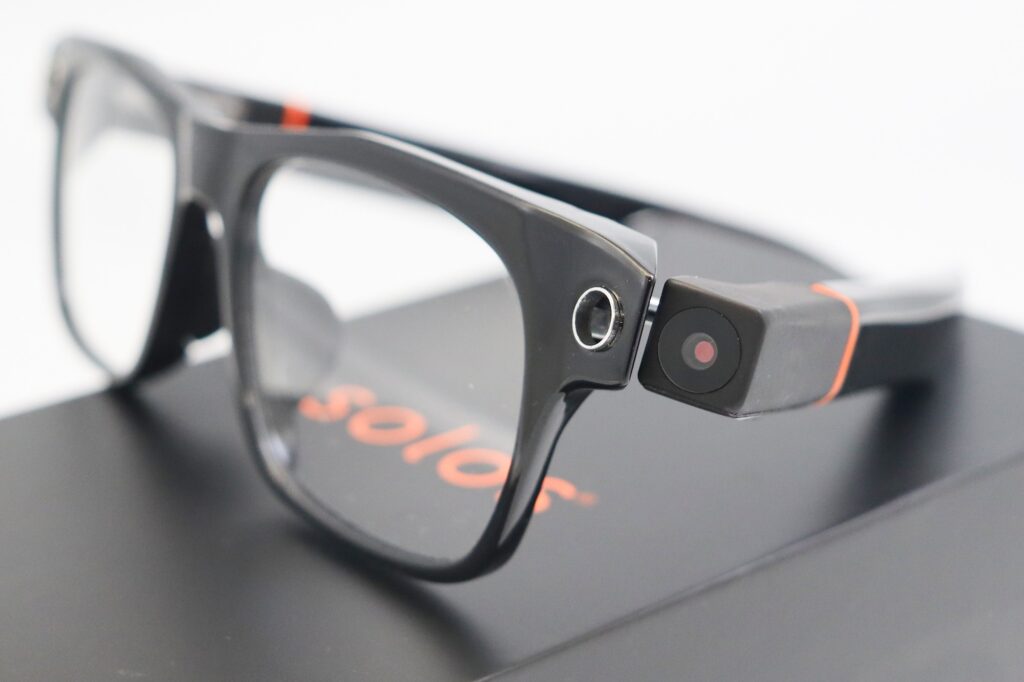The world of smart glasses is heating up with a new contender entering the arena. Solos, a smart glasses manufacturer, has unveiled the AirGo Vision, positioning itself as a formidable competitor to Meta’s Ray-Ban smart glasses. What sets the AirGo Vision apart is its integration of OpenAI’s powerful GPT-4o AI model, making it the world’s first smart glasses to harness this advanced technology. Let’s dive into what this means for the future of wearable tech and how it stacks up against the competition.

GPT-4o Integration: A Game-Changer for Smart Glasses
The most striking feature of the Solos AirGo Vision is its incorporation of OpenAI’s GPT-4o, a state-of-the-art AI model. This integration opens up a world of possibilities:
- Real-time object recognition
- Ability to answer questions based on the user’s surroundings
- Potential for more natural, context-aware interactions
By leveraging GPT-4o, Solos is aiming to create a more intelligent and responsive wearable experience, one that can understand and interact with the world around the user in real-time.
Vision and Interaction: A New Focus for Smart Glasses
While Meta’s Ray-Ban smart glasses have primarily focused on social sharing and communication, the AirGo Vision takes a different approach:
1. Environmental Interaction
The AirGo Vision’s camera, combined with GPT-4o, allows users to interact with their environment in new ways:
- Identify objects and landmarks in real-time
- Provide information about what the user is seeing
- Potentially offer translation services for text in the user’s field of view
2. Contextual Assistance
By understanding the user’s surroundings, the AirGo Vision can offer more relevant and timely assistance:
- Provide historical information about buildings or artworks
- Offer recipe suggestions when looking at ingredients
- Give maintenance tips when focusing on household appliances
3. Hands-Free Information Access
The combination of voice commands and visual input could make accessing information more seamless than ever:
- Ask questions about what you’re seeing without needing to type or search
- Get instant clarification on visual information
- Potentially control smart home devices based on what you’re looking at
Addressing Privacy Concerns
As with any camera-equipped wearable device, privacy is a significant consideration. Solos has taken steps to address these concerns:
- Detachable Camera Module: Users can remove the camera when privacy is a priority
- User Control: Likely options to control when and how the camera and AI features are activated
- Transparency: Clear indicators when the camera is in use to inform those around the wearer
By offering these options, Solos aims to balance the powerful features of their smart glasses with respect for privacy, both for the user and those around them.
Solos AirGo Vision vs. Meta Ray-Ban: A Tale of Two Approaches
The emergence of the AirGo Vision highlights two distinct philosophies in the smart glasses market:
Meta Ray-Ban: Social Connectivity
- Focus on sharing experiences through photos and videos
- Emphasis on hands-free calling and audio features
- Integration with Meta’s social platforms
Solos AirGo Vision: AI-Powered Environmental Interaction
- Real-time analysis and information about surroundings
- Potential for more diverse applications beyond social sharing
- Leveraging advanced AI for a more intelligent wearable experience
This divergence in approach offers consumers more choice, catering to different preferences and use cases in the smart glasses market.
The Future of Smart Glasses: What This Means for Wearable Tech
The introduction of GPT-4o-powered smart glasses like the AirGo Vision could have far-reaching implications for the wearable tech industry:
1. Accelerated AI Integration
As Solos demonstrates the potential of advanced AI in smart glasses, we may see other manufacturers racing to incorporate similar capabilities.
2. Expanded Use Cases
The ability to interact intelligently with one’s environment could open up new applications for smart glasses in fields like education, tourism, and professional services.
3. Improved Accessibility
AI-powered smart glasses could offer significant benefits for users with visual or cognitive impairments, providing real-time assistance and information.
4. Privacy Innovation
As privacy concerns remain at the forefront, we may see further innovations in how smart glasses balance functionality with respect for privacy.
Challenges and Considerations
While the potential of GPT-4o-powered smart glasses is exciting, there are challenges to consider:
- Battery Life: Running advanced AI models could impact battery performance
- Cost: The integration of cutting-edge AI may result in a higher price point
- User Experience: Ensuring that AI-powered features enhance rather than distract from daily life will be crucial
- Ethical Considerations: The use of AI in wearable tech raises questions about data usage and potential biases
Conclusion: A New Era for Smart Glasses
The introduction of Solos’ AirGo Vision marks an exciting development in the world of smart glasses. By integrating OpenAI’s GPT-4o, Solos is pushing the boundaries of what’s possible in wearable tech, offering a vision of smart glasses that are not just connected, but truly intelligent.
As competition in this space heats up, consumers stand to benefit from a wider range of options and more innovative features. Whether you’re drawn to the social connectivity of Meta’s Ray-Ban glasses or the AI-powered environmental interaction of the AirGo Vision, the future of smart glasses looks brighter and more diverse than ever.
The coming months and years will likely bring further developments in this space, as manufacturers refine their approaches and explore new applications for AI in wearable tech. One thing is clear: the era of truly smart glasses is upon us, and it’s set to transform how we interact with the world around us.










Add Comment